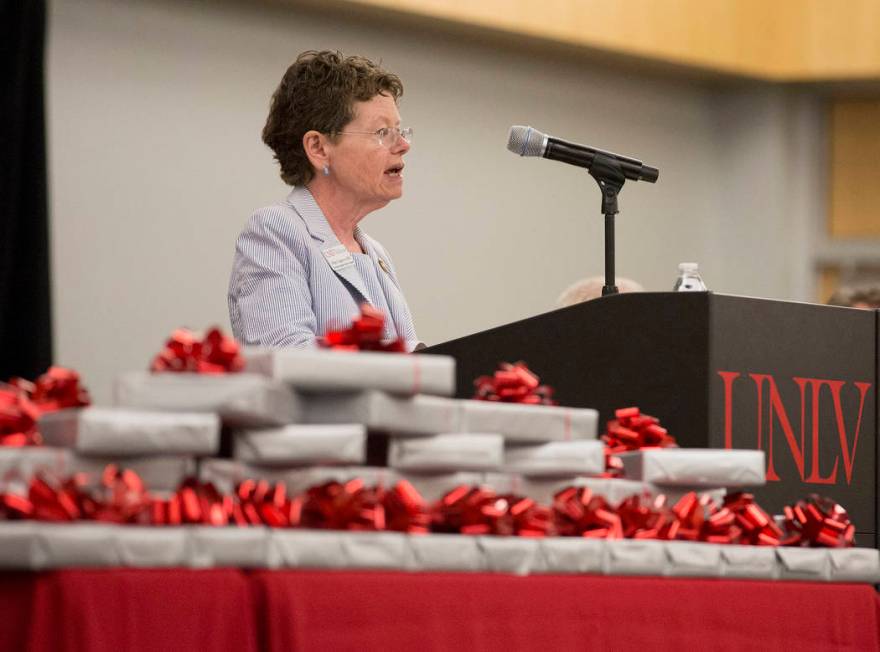UNLV medical school program tackles physician ‘burnout syndrome’

In a world of rapidly expanding knowledge, increasing certification requirements, changing regulatory requirements and the ongoing federal debate over health care, U.S. physicians are susceptible to feeling exhausted, cynical and ineffective.
At least that’s what the experts say. It is time to address “burnout syndrome” among the nation’s doctors, according to a paper from several Mayo Clinic physicians published earlier this year.
At UNLV’s School of Medicine, on Shadow Lane near University Medical Center, this means addressing physician burnout with medical students before it has a chance to become a problem. The school’s medicine wellness program is aimed at providing students with the skills to manage stress and maintain a healthy lifestyle while in school and as a physician.
“There’s a growing recognition that physicians who take better care of themselves and are happier in their practice of medicine give better care,” said Vice Dean Dr. Ellen Cosgrove. “Physician burnout contributes or impacts negatively on patient care. So this does tie back around to the patient.”
The program includes access to the student health center, health insurance and counseling and psychological services. The school is also emphasizing wellness by offering extracurricular activities such as yoga, tai chi, meditation and nutrition and exercise guidance. Students also will have opportunities to get out of the classroom and participate in music, art and theater at the Marjorie Barrick Fine Art Museum on the UNLV campus and the Smith Center for the Performing Arts.
The program was largely designed by Dr. Anne Weisman, director of wellness and integrative medicine at UNLV. Weisman’s specialty includes using massage therapy to treat patients; she has spent more than a decade volunteering as a massage therapist for HIV/AIDS and hospice patients.
“I think the opportunity to teach our students to look at their patients or themselves in this way is wonderful,” Weisman said. At the end of the first week of training, Weisman and students discussed their health and their goals, Weisman said.
Yoga classes offered to the students will be lead by Joyce and Darwin Bosen of Trauma Recovery Yoga, which caters to clients who have experienced trauma, including veterans, brain-injury patients and at-risk youth.
Wellness activities are optional, Weisman said, though she hopes that students take advantage of them to augment their experience.
“I don’t want these things to be something that adds more stress to their life,” Weisman said. “No more ‘I have to’ or ‘I should.’”
Working with the curriculum
The medical school’s wellness program was designed to work in tandem with curriculum, which emphasizes “integrative medicine,” an approach that addresses the physical, emotional, mental, social, spiritual and environmental aspects of a patient’s health.
It also recognizes that many patients are using alternative therapies, including acupuncture, yoga or meditation.
Integrative medicine and physician wellness go hand in hand, Cosgrove said.
“(Doctors) get the exhilaration of seeing some of the most wonderful times in people’s lives, like the birth of a child, but also some of the most devastating times in people’s lives, like the death of a child,” she said. “Those are some of the things … that can cause a great deal of stress. Having a good wellspring of health practices and staying centered is very useful.”
Throughout their four years in school, students will hear from guest lecturers who practice these methods, such as acupuncturists and yoga instructors.
“Many medical schools are now starting to introduce (integrative medicine) in one way or another,” Cosgrove said. “Because let’s face it: If 60 percent of the population is using some integrative therapies, it’s important for physicians to understand how that can work with conventional medical therapies.”
Contact Madelyn Reese at mreese@viewnews.com or 702-383-0497. Follow @MadelynGReese on Twitter.